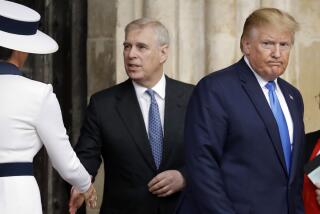Jefferies Says Some Notes on GAF Were Destroyed
- Share via
NEW YORK — Boyd L. Jefferies admitted destroying hundreds of pages of written notes, some related to his brokerage firm’s allegedly illegal dealings with GAF Corp., as a criminal trial of GAF and its vice chairman continued Thursday in New York.
Jefferies, the former chairman of the Los Angeles-based securities firm Jefferies Group Inc., ended his third day on the stand in federal court as the prosecution’s star witness in the criminal stock manipulation trial.
Jefferies’ testimony about destroying notes came as Arthur L. Liman, GAF’s lead defense lawyer, began his cross-examination. Liman, noted for his grilling of Lt. Col. Oliver North during the nationally televised congressional hearings on the Iran-Contra affair in 1987, on Thursday began his attempt to discredit Jefferies.
Under questioning, Jefferies admitted that he routinely destroyed legal pads containing detailed notes of each day’s conversations with clients. He said that even after he reached an agreement in March, 1987, to cooperate with prosecutors and plead guilty to two felony counts, he and his secretary cleaned out his office and threw away about three months of notes, even though he had agreed to turn over all pertinent records to the government.
“Is it a fact, Mr. Jefferies, that you destroyed the yellow pads and other notes you had taken after you began cooperating with the government?” Liman asked.
“Yes, they were thrown out,” Jefferies said.
Defense lawyers, meanwhile, continued to argue for a mistrial Thursday, claiming that the government had until recently deliberately withheld a report by a documents expert that someone had used “white-out” fluid to alter a key piece of evidence in the case.
Report of Correction Fluid
The report related to the authenticity of a Jefferies & Co. invoice sent to GAF in November, 1986. Jefferies has testified that the firm was owed $40,000 by GAF for losses incurred in buying Union Carbide stock to bid up its price at GAF’s request. But Jefferies had said that at the request of GAF Vice Chairman James T. Sherwin, the invoice was falsified to make it appear that the bill was for investment banking services related to the firm’s purchase of stock in a British company, Davy Corp.
The report, by Pennsylvania documents expert Gus R. Lesnivich, said that correction fluid was used to cover over a reference to Davy Corp. on the invoice. It wasn’t clear Thursday when the document might have been altered, or what significance the report would have as evidence.
But in arguing for the mistrial, Stephen Kaufman, Sherwin’s lawyer, charged that the government had “made a deliberate, calculated, tactical decision not to disclose this report.” Liman said the possibility of document tampering was “a dynamite issue, whichever way it’s resolved.”
Assistant U.S. Atty. Carl H. Loewenson Jr. has said that the expert’s report had been withheld from defense lawyers by mistake. U.S. District Judge Mary Johnson Lowe said she would probably rule next week on the mistrial motion.
In attempting to show inconsistencies in Jefferies’ story, Liman produced documents Thursday that he hoped would cast doubt on Jefferies’ claim that he had openly discussed an agreement with Sherwin that the brokerage firm would be reimbursed by GAF for any money it lost while bidding up Carbide stock. Liman noted that the text of Jefferies’ settlement agreement with the Securities and Exchange Commission said that there had been only an “implicit” agreement. Jefferies testified that he hadn’t read the settlement document carefully when he signed it.
As part of his agreement with the government, Jefferies had to resign from his firm in 1987. Under questioning Thursday, Jefferies acknowledged that he still owns nearly 15% of Jefferies Group through stock held in a non-voting trust. He hasn’t been sentenced yet on the felony charges, and he testified that he hopes to avoid prison and eventually return to work at the company. He said his picture still hangs on the wall at the company he founded.
Judge Lowe’s small courtroom has been jammed with spectators, many of them lawyers in other cases in which Jefferies is expected to testify for the government.
More to Read
Inside the business of entertainment
The Wide Shot brings you news, analysis and insights on everything from streaming wars to production — and what it all means for the future.
You may occasionally receive promotional content from the Los Angeles Times.











